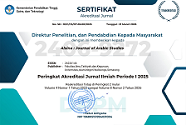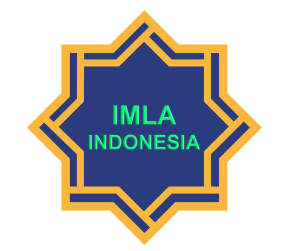 Accreditation
Accreditation
About the Journal
Alsina : Journal of Arabic Studies, ISSN 2477-8117 (e) 2477-8109 (p) is published by the Arabic Language Learning Department, Fakultas Ilmu Tarbiyah dan Kependidikan, Universitas Islam Negeri (UIN) Walisongo Semarang.
FOCUS
Alsina: Journal of Arabic Studies focuses on research-based articles on first, second, and foreign language learning. The aim is to publish original research articles (ORA) that explore language learning and teaching. Its scope is international in that it welcomes articles from academics, researchers, graduate students, and policymakers. The articles should be in English, Arabic or Indonesian Language.
SCOPE
This journal encompasses original research articles, review articles, and short communications, including:
- Arabic Language Acquisitions,
- History of Arabic Language
- Alquran and Arabic Language
- Translation and language learning,
- Foreign language learning and identity,
- Gender and equality in Arabic language learning,
- Foreign language skills,
- Linguistics and Arabic language learning, including: Arabic Syntax, Arabic Literature and Balaghah, Arabic Semantics
- Literature and Arabic language learning, and
- Foreign language teaching and learning.
Besides these topic of Arabic language teaching and learning including: Arabic Teaching Methods, Arabic Teaching Media, Curriculum Development of Arabic Teaching, Arabic Teaching Policies, Arabic Teaching Evaluation, all disciplinary perspectives are welcomed, from linguistics and psychology to anthropology, cognitive science, neuroscience, sociology, and religious studies.
Peer Review Process
Alsina : Journal of Arabic Studies, published two times a year, is a trilingual (English, Arabic, and Bahasa), peer-reviewed journal, and specializes in Arabic Language Learning and theories in general. All submitted papers are subject to the single-blind review process. Click here to get the information about author guidelines.
All manuscripts submitted to this journal must follow focus and scope, and author guidelines of this journal. The submitted manuscripts must address scientific merit or novelty appropriate to the focus and scope. All manuscripts must be free from plagiarism contents. All authors are suggested to use plagiarism detection software to do the similarity checking. Editors check the plagiarism detection of articles in this journal by using a Turnitin software.
The research article submitted to this journal will be single-blind review process at least 2 (two) or more expert reviewers. The reviewers give scientific valuable comments improving the contents of the manuscript.
Final decision of articles acceptance will be made by Editors according to reviewers comments. Publication of accepted articles including the sequence of published articles will be made by Editor in Chief by considering sequence of accepted date and geographical distribution of authors as well as thematic issue.
Publication Frequency
This journal published twice in a year.
Open Access Policy
This journal provides immediate open access to its content on the principle that making research freely available to the public supports a greater global exchange of knowledge.
Publication Ethics and Malpractice Statement
Alsina : Journal of Arabic Studies, ISSN 2477-8117 (e) 2477-8109 (p) is published by the Arabic Language Learning Department, Fakultas Ilmu Tarbiyah dan Kependidikan, Universitas Islam Negeri (UIN) Walisongo Semarang.
Alsina : Journal of Arabic Studies, published two times a year, is a trilingual (English, Arabic, and Bahasa), peer-reviewed journal, and specializes in Arabic Language Learning, theories, and thoughts on Islamic studies in general.
It is available online as open access sources as well as in print. This statement clarifies the ethical behavior of all parties involved in the act of publishing an article in this journal, including the author, the editor-in-chief, the Editorial Board, the reviewer, and the publisher.
Ethical Guideline for Journal Publication
The publication of an article in Alsina : Journal of Arabic Studies is an essential building block in the development of a coherent and respected network of knowledge. It is a direct reflection of the quality of the work of the authors and the institutions that support them. Peer-reviewed articles support and embody the scientific methods. It is therefore important to agree upon standards of expected ethical behavior for all parties involved in the act of publishing: the author, the editor, the reviewer, the publisher, and the society. As the publisher, it takes its duties of guardianship over all stages of publishing seriously and it recognizes its ethical and other responsibilities. Publisher committed to ensuring that advertising, reprint or other commercial revenue has no impact or influence on editorial decisions.
Publication decisions
The editor of the Alsina : Journal of Arabic Studies is responsible for deciding which of the articles submitted to the journal should be published. The validation of the work in question and its importance to researchers and readers must always drive such decisions. The editors may be guided by the policies of the journal's editorial board and constrained by such legal requirements as shall then be in force regarding libel, copyright infringement and plagiarism. The editors may confer with other editors or reviewers in making this decision.
Fair play
An editor at any time evaluate manuscripts for their intellectual content without regard to race, gender, sexual orientation, religious belief, ethnic origin, citizenship, or political philosophy of the authors.
Confidentiality
The editor and any editorial staff must not disclose any information about a submitted manuscript to anyone other than the corresponding author, reviewers, potential reviewers, other editorial advisers, and the publisher, as appropriate.
Disclosure and conflicts of interest
Unpublished materials disclosed in a submitted manuscript must not be used in an editor's own research without the express written consent of the author.
Duties of Reviewers
Peer review assists the editor in making editorial decisions and through the editorial communications with the author may also assist the author in improving the paper.
Promptness
Any selected referee who feels unqualified to review the research reported in a manuscript or knows that its prompt review will be impossible should notify the editor and excuse himself from the review process.
Confidentiality
Any manuscripts received for review must be treated as confidential documents. They must not be shown to or discussed with others except as authorized by the editor.
Standards of Objectivity
Reviews should be conducted objectively. Personal criticism of the author is inappropriate. Referees should express their views clearly with supporting arguments.
Acknowledgement of Sources
Reviewers should identify relevant published work that has not been cited by the authors. Any statement that an observation, derivation, or argument had been previously reported should be accompanied by the relevant citation. A reviewer should also call to the editor's attention any substantial similarity or overlap between the manuscript under consideration and any other published paper of which they have personal knowledge.
Disclosure and Conflict of Interest
Privileged information or ideas obtained through peer review must be kept confidential and not used for personal advantage. Reviewers should not consider manuscripts in which they have conflicts of interest resulting from competitive, collaborative, or other relationships or connections with any of the authors, companies, or institutions connected to the papers.
Duties of Authors
Reporting standards
Authors of reports of original research should present an accurate account of the work performed as well as an objective discussion of its significance. Underlying data should be represented accurately in the paper. A paper should contain sufficient detail and references to permit others to replicate the work. Fraudulent or knowingly inaccurate statements constitute unethical behaviour and are unacceptable.
Originality and Plagiarism
The authors should ensure that they have written entirely original works, and if the authors have used the work and/or words of others that this has been appropriately cited or quoted.
Multiple, Redundant or Concurrent Publication
An author should not in general publish manuscripts describing essentially the same research in more than one journal or primary publication. Submitting the same manuscript to more than one journal concurrently constitutes unethical publishing behaviour and is unacceptable.
Acknowledgement of Sources
Proper acknowledgment of the work of others must always be given. Authors should cite publications that have been influential in determining the nature of the reported work.
Authorship of the Paper
Authorship should be limited to those who have made a significant contribution to the conception, design, execution, or interpretation of the reported study. All those who have made significant contributions should be listed as co-authors. Where there are others who have participated in certain substantive aspects of the research project, they should be acknowledged or listed as contributors. The corresponding author should ensure that all appropriate co-authors and no inappropriate co-authors are included on the paper, and that all co-authors have seen and approved the final version of the paper and have agreed to its submission for publication.
Disclosure and Conflicts of Interest
All authors should disclose in their manuscript any financial or other substantive conflict of interest that might be construed to influence the results or interpretation of their manuscript. All sources of financial support for the project should be disclosed.
Fundamental errors in published works
When an author discovers a significant error or inaccuracy in his/her own published work, it is the author’s obligation to promptly notify the journal editor or publisher and cooperate with the editor to retract or correct the paper.Duties of Authors
Duties of Authors
Reporting standards
Authors of reports of original research should present an accurate account of the work performed as well as an objective discussion of its significance. Underlying data should be represented accurately in the paper. A paper should contain sufficient detail and references to permit others to replicate the work. Fraudulent or knowingly inaccurate statements constitute unethical behaviour and are unacceptable.
Originality and Plagiarism
The authors should ensure that they have written entirely original works, and if the authors have used the work and/or words of others that this has been appropriately cited or quoted.
Multiple, Redundant or Concurrent Publication
An author should not in general publish manuscripts describing essentially the same research in more than one journal or primary publication. Submitting the same manuscript to more than one journal concurrently constitutes unethical publishing behaviour and is unacceptable.
Acknowledgement of Sources
Proper acknowledgment of the work of others must always be given. Authors should cite publications that have been influential in determining the nature of the reported work.
Authorship of the Paper
Authorship should be limited to those who have made a significant contribution to the conception, design, execution, or interpretation of the reported study. All those who have made significant contributions should be listed as co-authors. Where there are others who have participated in certain substantive aspects of the research project, they should be acknowledged or listed as contributors. The corresponding author should ensure that all appropriate co-authors and no inappropriate co-authors are included on the paper, and that all co-authors have seen and approved the final version of the paper and have agreed to its submission for publication.
Disclosure and Conflicts of Interest
All authors should disclose in their manuscript any financial or other substantive conflict of interest that might be construed to influence the results or interpretation of their manuscript. All sources of financial support for the project should be disclosed.
Fundamental errors in published works
When an author discovers a significant error or inaccuracy in his/her own published work, it is the author’s obligation to promptly notify the journal editor or publisher and cooperate with the editor to retract or correct the paper.

Article Processing Charges
Submission to Alsina: Journal of Arabic Studies is free of charge. Authors will only be asked to pay the publication fee after their manuscript has been accepted.
Policy of Screening for Plagiarism
Articles submitted to Alsina: Journal of Arabic Studies will be filtered using Turnitin software, with a maximum of 20% similarities permitted.
Plagiarism includes:
- Word-for-word plagiarism – borrowing another author’s language word-for-word but not putting it in quotation marks or citing it correctly.
- Source plagiarism – using the ideas of others without giving recognition or citing the source explicitly.
- Plagiarism of authorship – presenting another author's work as one’s own.
- Self-plagiarism - authors publishing an article in more than one journal by recycling papers. The important issue related to self-plagiarism is that when citing one's own work, significant changes must have been made to the new article. The previous article should only contain a small percentage of any new article produced. So readers will receive new information, which tmay inspired by but different from the previous articles.
Abstracting & Indexing
- SINTA
- Garda Rujukan Digital
- Google Scholar
- Dimensions
- MORAREF
- Academia
- BASE - Bielefeid Academic Search Engine
- Crossref

.png)

 In Collaboration with
In Collaboration with 

 Visitors
Visitors  Article Template
Article Template





